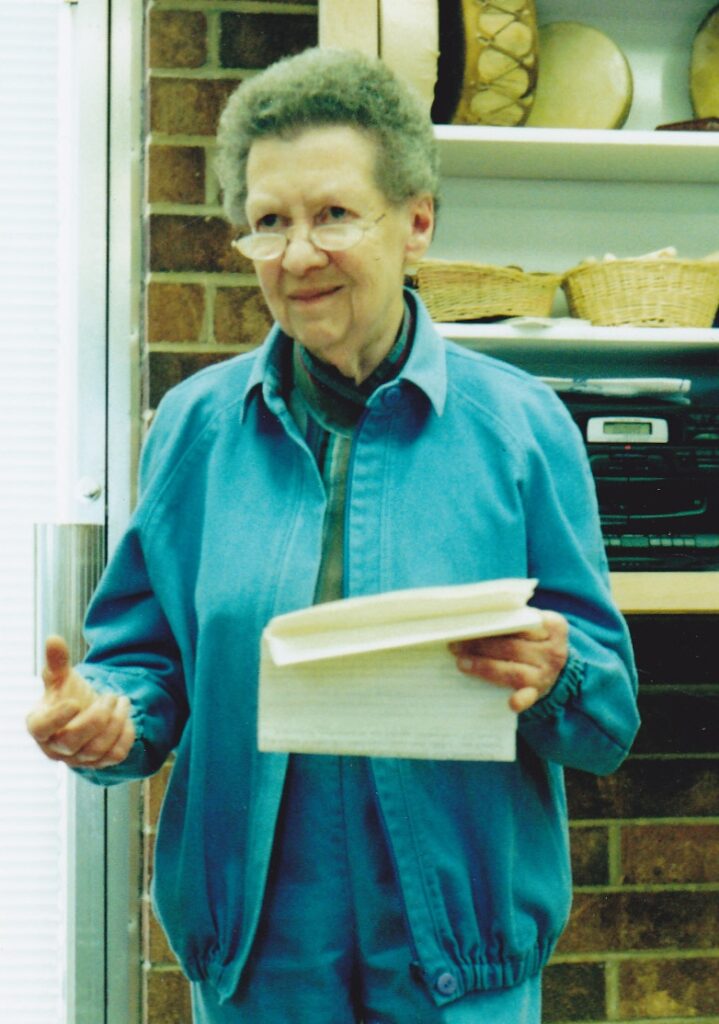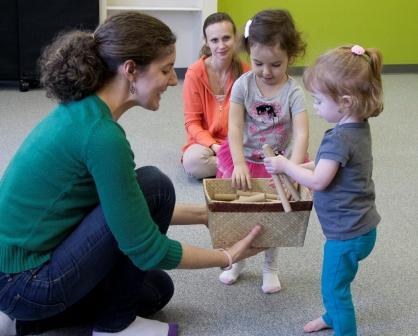Audrey Sillick was born in 1921, and was 92 years of age upon her death. She had been ill for some time, but was able to live in her apartment in Toronto throughout the last years. Friends accompanied and assisted her in the last days.
Audrey was born in England, and spent her childhood and youth in England, India and Switzerland. Audrey’s years in India influenced her life greatly – learning to play by herself, outside in the wonderful world of nature; studying at a fine teacher’s college and meeting Maria Montessori during her time in India; spending countless hours observing, especially of the world of animals and children.

After moving to Canada and spending years in the United States, Audrey joined the Montessori movement, becoming founder and director of the Toronto Montessori Teacher Training Institute in 1971. Her particular areas of expertise concerned the role of movement in learning, the process of language acquisition and the understanding of the child in nature. Audrey influenced innumerable Montessorians through the Institute, but also through speaking and teaching engagements throughout the Montessori Community. This included Renilda Montessori, granddaughter of Maria, who taught with Audrey and Lorna at the TMI.
Audrey’s teachings are central to Musikgarten, indeed her work has influenced countless early childhood music teachers and Montessori teachers. I met Audrey in the early 1980s. Having moved to Toronto after my recent marriage, I soon was asked to teach at the Toronto Montessori School and was sent to hear Audrey’s lectures at the Teacher Training Institute there, to become better acquainted with my new environment.
What a life-changing event that turned out to be! Audrey’s lectures were fascinating, although at first, the approach was such a new world for me, I could hardly take notes fast enough! From the beginning of our acquaintance Audrey’s message became a stronger and stronger component of my work in early childhood music.
For the authors, teacher trainers, and teachers in the Musikgarten community, our work is unthinkable without her. She was the central influence that has made Musikgarten such a balanced curriculum. Through Audrey we learned about the child, we learned about nature, we learned to observe, to include movement in all of our teaching … we learned to tell stories, to reintroduce poetry to young children …. We learned!
Audrey believed in what she called ‘subversive’ education. With that she meant was that you have the greatest influence, when you observe where your learner stands, and offer an environment of small steps to help the learner move forward. I often tell the story of this ‘subversive’ effect on me. In the 1980s I knew that what I learned from her was important –so I wrote it down and included the ‘Audrey speech’ in all of my workshops. After a few years, while teaching in Panang in Malaysia, my husband was in the room for one of my speeches. Afterwards he said to me, you are no longer talking about what Audrey says, it has so influenced you, the knowledge has become yours to also impart. Audrey’s influence was slow and sure!
What are my favorite memories of Audrey?
- That very first speech I invited her to give for the very first international meeting of early childhood music teachers which I held in 1984 in Toronto – the forerunner of the ECMMA!
- Working on our first publication in the late 1980s. As Audrey always told the story, I stopped by her house one afternoon shortly after she had retired, and asked her to guide me ’a little’ That positive answer turned into a working gig = shared authorship – which we enjoyed for over 20 years! For the first publication we worked on a very early, very cranky computer! But had much more fun training the blue jays to come to our window to get their supply of peanuts!
- Celebrating Audrey’s 80th birthday together with the Musikgarten Teacher Trainers in Sedona, Arizona!
- Audrey’s young-child-in-a-snow-suit story, through which she had us laughing and crying at the New Jersey Convention in 1988.
- Sitting on our deck in Greensboro, deciding what kind of sandwich we would each take along on our pretend picnic? And this was going to be in our new Musikgarten curriculum?
Audrey treasured the natural world and went to great lengths to help preserve it. Audrey’s legacy is contained in the many teachers she trained, mentored, and through the Musikgarten curriculum.
Lorna Heyge, Musikgarten






